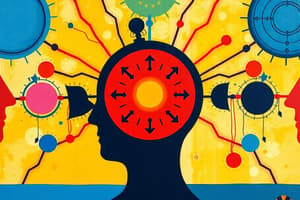Podcast
Questions and Answers
What do survival values prioritize over self-expression values?
What do survival values prioritize over self-expression values?
- Artistic creativity
- Economic and physical security (correct)
- Personal happiness
- Cultural traditions
Which cognitive bias involves selectively gathering information that confirms pre-existing beliefs?
Which cognitive bias involves selectively gathering information that confirms pre-existing beliefs?
- Confirmation bias (correct)
- Cognitive dissonance
- Rationality
- Unacceptability bias
What does social storytelling primarily function to do within a society?
What does social storytelling primarily function to do within a society?
- Document historical events
- Create competitive narratives
- Provide entertainment without a purpose
- Develop a sense of belonging (correct)
What is NOT one of the four functions of myths?
What is NOT one of the four functions of myths?
What does the concept of monomyth suggest about myths?
What does the concept of monomyth suggest about myths?
Which cognitive dissonance example illustrates the conflict when beliefs are challenged?
Which cognitive dissonance example illustrates the conflict when beliefs are challenged?
What is the cosmological function of myths primarily concerned with?
What is the cosmological function of myths primarily concerned with?
What does the term 'belief' refer to in the context of cognitive biases?
What does the term 'belief' refer to in the context of cognitive biases?
What is a notable characteristic of initiation in the monomyth concept?
What is a notable characteristic of initiation in the monomyth concept?
According to John Berger's theories, how does context affect our perception?
According to John Berger's theories, how does context affect our perception?
What is one reason people tend to believe in conspiracy theories?
What is one reason people tend to believe in conspiracy theories?
What does cancel culture primarily involve?
What does cancel culture primarily involve?
Which of the following is NOT a characteristic of conspiracy theories?
Which of the following is NOT a characteristic of conspiracy theories?
What is one sociological implication of humor within cultures?
What is one sociological implication of humor within cultures?
What is the primary outcome of the hero's return in the monomyth concept?
What is the primary outcome of the hero's return in the monomyth concept?
Why might humor about other societies strengthen group spirit?
Why might humor about other societies strengthen group spirit?
What does the term 'captology' refer to?
What does the term 'captology' refer to?
Which stage is NOT part of Christopher Vogler's hero's journey?
Which stage is NOT part of Christopher Vogler's hero's journey?
How does Maria Tatar's work differ from Joseph Campbell's?
How does Maria Tatar's work differ from Joseph Campbell's?
Which aspect of culture is emphasized as likely to change quickly?
Which aspect of culture is emphasized as likely to change quickly?
What is a common misconception about hero archetypes as discussed in the content?
What is a common misconception about hero archetypes as discussed in the content?
Which character type in Vogler's hero's journey serves as an obstacle but can be understood and overcome?
Which character type in Vogler's hero's journey serves as an obstacle but can be understood and overcome?
What does Carl Jung suggest is essential for a complete life?
What does Carl Jung suggest is essential for a complete life?
Which trait is commonly associated with heroines in Tatar's exploration of myths and folklore?
Which trait is commonly associated with heroines in Tatar's exploration of myths and folklore?
What is primarily at the root of cultural conflicts as the world becomes more interconnected?
What is primarily at the root of cultural conflicts as the world becomes more interconnected?
What characteristic defines a hero according to the content?
What characteristic defines a hero according to the content?
Flashcards are hidden until you start studying
Study Notes
Survival vs Self-Expression Values
- Emphasis on economic and physical security as opposed to well-being, self-expression, and quality of life.
Cognitive Biases
- Mental shortcuts humans use to simplify information.
- Unacceptability bias: Systemic difference in response rates or test uptake due to 'unacceptability.'
- Confirmation bias: Seeking information that confirms existing beliefs and dismissing contradictory data.
Rationality, Blasphemy, and Belief
- Rationality: Clear thinking and reasoning, making decisions based on logic.
- Blasphemy: Disrespect for something considered sacred.
- Belief: Conviction in the truth of a statement or existence of a being or phenomenon.
- Beliefs fill the unknown, helping us maintain a sense of purpose.
- Cognitive dissonance: Mental conflict when beliefs/assumptions clash with new information.
Social Storytelling
- Social storytelling: Educates and fosters a sense of belonging to a society (e.g., myths, legends, traditions).
- Traditions: Stories, beliefs, and behaviors ingrained in a group's culture over time.
- Fairytale: Stories featuring marvelous elements and occurrences.
- Legend: Traditional stories about a person or place, potentially incorporating mythology or explaining natural phenomena.
- Myth: Symbolic narrative, often involving deities or superhuman beings in extraordinary events.
- Myths are the foundations of human societies.
- Monomyths: All mythic narratives as variations of a single overarching story.
- Four functions of myths:
- Metaphysical function: Evokes awe and wonder towards the mystery of existence.
- Cosmological function: Explains how the universe operates.
- Cultural function: Promotes a shared identity and understanding within a society.
- Psychological function: Provides frameworks for individual and collective experiences.
Cultural Differences and Conflicts
- Cultural differences are more enduring than political and economic differences.
- Conflicts arise where civilizations meet due to varying histories, religions, languages, and values.
- Fukuyama emphasizes ideological convergence, while Huntington focuses on cultural divergence.
Explaining the World through Storytelling
- "We see the world with our stories."
- Captology: The study of technology's persuasive power.
Storytelling and its Evolution
- Ernest Hemingway's six-word stories demonstrate the potential for brevity in storytelling.
- There is no single formula for effective storytelling.
- Joseph Campbell's 17 stages of a monomyth: Every myth shares similar stages.
- Maria Tatar's "The Heroine with 1001 Faces" challenges the male-centric focus of Campbell's work.
- Highlights the often-overlooked role of women as heroes in traditional narratives.
- Emphasizes the evolution of storytelling to accommodate cultural shifts, especially moving beyond rigid gender binaries.
Carl Jung and Collective Unconsciousness
- Explains the potential insanity of a life without myth.
- People are shaped by their historical context and are complete only when connected to it.
- Collective unconscious: A shared, inherited part of the unconscious mind, stemming from ancestral experiences.
- Archetypes: Universal patterns and images from the collective unconscious, representing models of people, behaviors, or personalities.
Christopher Vogler's Hero's Journey
- A hero's journey unfolds in stages:
- Hero: Someone willing to sacrifice personal needs for others.
- Mentor: Characters who teach, protect, and provide gifts to the hero.
- Threshold Guardian: A daunting obstacle that must be overcome, often through understanding.
- Herald: A force introducing a new challenge for the hero.
- Shapeshifter: Characters whose appearance changes from the hero's perspective.
- Shadow: The embodiment of the dark side, representing inner conflicts or opposing forces.
- Ally: Someone who assists the hero throughout the journey, fulfilling various roles.
- Trickster: Represents mischief and the desire for change.
- Jester: Someone kept by rulers to entertain with silliness and jokes.
Stages of the Hero's Journey
- Departure: The hero is called to adventure, leaving familiarity behind.
- Initiation: The hero ventures into an extraordinary world, facing trials that test courage and resolve.
- Return: The transformed hero returns to everyday life, their journey impacting the community or world.
Humor and Laughter
- Henri Bergson: Explores the nature of laughter and its purpose.
- Humor: Communication that evokes amusement.
- We laugh to "punish" those who appear or behave differently from ourselves.
- Jokes about other societies can strengthen a group's identity and sense of belonging.
Cancel Culture
- Withdrawing support from individuals or their work due to opinions or actions deemed unacceptable..
Visual Communication and Context
- An image, graph, or number may not be worth a thousand words, but it is more than a thousand words if it has context.
- John Berger's "Ways of Seeing": We do not all perceive things the same way.
- Context influences our understanding and interpretation of visual information.
Conspiracy Theories
- Belief that an influential, covert organization is responsible for an event or situation.
- Characteristics of conspiracy theories:
- A hidden, secret plot
- A group of conspirators
- Alleged evidence supporting the theory.
- Denial of coincidence or chance, suggesting everything is connected.
- A division into "good" and "bad" forces.
- Scapegoating of individuals or groups.
Why do people believe in conspiracy theories?
- A reaction to a complex world, seeking simpler explanations.
- A sense of being in control, even when the truth is unsettling.
- Desire for belonging and social acceptance, aligning with a group.
"True" Conspiracies
- Edward Snowden argues that dangerous conspiracies are not covert, but occur openly through practices in law, policy, technology, and finance.
- These "true" conspiracies are often concealed mechanisms of power and control, designed to benefit specific actors.
Studying That Suits You
Use AI to generate personalized quizzes and flashcards to suit your learning preferences.



